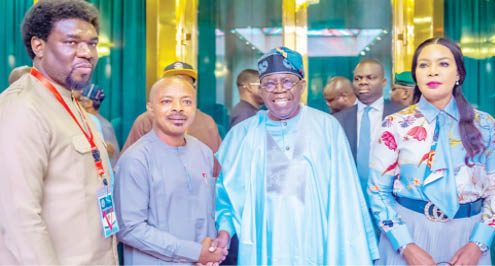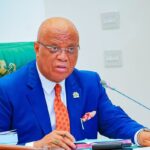The Nigeria Labour Congress (NLC) and the Trade Union Congress (TUC) yesterday gave reasons why they accepted N70,000 as the new minimum wage for workers across the country.
The organised labour spoke after their meeting with President Bola Ahmed Tinubu at the Presidential Villa in Abuja.
Before now, the unions had insisted that they will not accept any amount below N250,000 as the minimum wage that will be acceptable by workers. This was after they brought down their demand from an initial N615,000, citing the prevailing economic hardship in Nigeria as the basis for their demand.
The workers’ representatives pointed to President Tinubu’s removal of fuel subsidy without putting in place shock absorbers to cushion the effects of that action.
- N70,000 minimum wage: How Tinubu convinced labour leaders
- JAMB pegs cut-off mark at 140 for varsities, 100 for others
They argued further that the floating of the naira, side by side subsidy removal made life extremely difficult for millions of Nigerians as cost of living quadrupled.
The labour also cited the hike in electricity tariff, among others, as reasons for their demand.
While making reference to the April 18,2024 expiration date of the N30,000 minimum wage being implemented especially at the national level since 2019, the labour leaders continued to insist that the government must put in place a wage that will take care of the basic necessities of life for the average worker.
However, the governments at both the national and sub-national levels kept saying that there are no sufficient funds to meet the demands of the Nigerian workforce.
Last week, Labour met with President Tinubu but were unable to reach an agreement until yesterday.
The president said he had to intervene in the negotiations, knowing the economic challenges faced by many Nigerians, and the need to provide urgent succour.
There is more to N70,000 – Ajaero
Addressing State House reporters after the meeting with President Tinubu yesterday, Joe Ajaero, who is the President of NLC, said they accepted the offer because of the prevailing situation in the country, and the promises made by Tinubu that the minimum wage would be reviewed every three years instead of five years.
“What has been announced in terms of the amount of N70,000 happened to be where we are now. But the thing about it is that we will not wait for another five years to come for another review. Rather than settling on a figure that we (will) wait for five years, is like we will have to now negotiate even two times within five years, with a view to going up.
“That is one of the reasons we decided to reach where we are today. Because of the proviso that you know, you can review in the next three years. The other one, we came with other issues in the basket, like the issue of SSANU, NASU and others, especially with the affront by the Commissioner of Police, FCT; we brought it to Mr President, for that matter to be addressed. And magnanimously, he asked the agencies concerned to work out the modalities for the payment of those workers in the universities.”
The Senior Staff Association of Nigerian Universities (SSANU) and the Non-Academic Staff Union of Universities (NASU) had staged a protest yesterday in Abuja, over non payment of their withheld salaries after they joined the Academic Staff Union of Universities (ASUU) in a prolonged strike action just before Tinubu took over power.
Ajaero said the government also promised other incentives which would lessen the burden of the prevailing hardship on Nigerians.
“We are taking it back to our constituency to see how we can get a buy in,” he said, adding that normally, their constituency always agrees with them.
In his remarks, the President of TUC, Festus Osifo said by next week, the federal government will put finishing touches to the minimum wage bill and transmit same to the National Assembly for passage.
The Minister of Information and National Orientation, Mohammed Idris, and the Minister of State for Labour, Nkeiruka Onyejeocha, had earlier offered additional explanations on the resolutions.
The Speaker of the House of Representatives, Abbas Tajudeen, in a reaction to the development, commended President Tinubu for agreeing to the new national minimum wage of N70,000.
Hours after, a statement issued by the Tinubu’s spokesman, Ajuri Ngelale, said the entitlements of members of the SSANU and NASU would be considered, urging the Ministries of Finance, and Budget & Economic Planning to look at the possibilities of clearing the backlog.
Efforts to speak with the Nigeria Governors Forum (NGF) were not successful last night.
Workers, CSOs have different views
Mr Tunde Salman, the Team Lead/Convener, Good Governance Team (GGT) Nigeria, said while the new minimum wage is a good development, its implementation, especially in the states, remains of concern.
The Executive Director, Resource Centre for Human Rights and Civic Education (CHRICED), Comrade Ibrahim Zikirullahi, said that the approval of N70,000 as the new national minimum wage is another indication that the welfare of Nigerians is not a top priority on the agenda of the current government.
“The question we should be asking the government is: what can N70,000 buy in Nigeria today? We can categorically say that that amount is not enough to buy a 50kg of rice, talk more of being enough to meet the basic needs of an average family of six people”, he asked.
Also, the Senior Communications Officer at Yiaga Africa, Mr Mark Amaza, said that while the new minimum wage is an improvement, it is grossly inadequate.
On his part, the Country Director of Action Aid Nigeria (AAN), Mr Andrew Mamedu, commended President Tinubu, saying it is a positive step toward improving the living conditions of the workforce.
Also, a cross section of federal workers in some ministries expressed mixed feelings about the development, but majorly said they expected more.
One of them, who gave her name simply as Mrs Habib, told Daily Trust that she expected nothing less than N120,000 given the present high cost of living.
When our correspondent interviewed workers in Maiduguri, the majority of them lamented bitterly about the newly approved wage.
A worker, Aisha Abubakar, said, for President Tinubu to approve only N70,000 meant that he does not appreciate the problems of Nigerians.
A federal worker in Kwara State who simply identified himself as Gboye, described the development as “disappointing”.
On her part, another female federal civil servant in the state, who preferred anonymity, expressed mixed feelings over the situation.
Private sector wary over compliance
The Organised Private Sector of Nigeria (OPSN) has expressed concern over its ability to pay the N70,000 newly approved minimum wage, saying private organisations are over-burdened by high cost of production.
The Director-General, Nigeria Employers’ Consultative Association (NECA), Mr. Adewale-Smatt Oyerinde, who spoke on behalf on the body, however, commended the federal government over the approval of the new minimum wage, urging it to put in place reforms that would strengthen private sector to be able to pay.
“While we commend the president for putting to rest the immediate issue of the National Minimum Wage, we also note, most importantly his commitment to support the sub-nationals and the organised private sector to pay the new wage,” he said.
The NECA DG noted that during the consultations with the National Minimum Wage Committee, the OPS expressed concern about its ability to pay the N62,000 recommended by the tripartite committee.
“In fact, the N62,000 was premised on the understanding and agreement by the government representatives that the government will take definite steps to reduce the current economic burden on the organized private sector,” he said.
He pleaded with the federal government to reverse the increase in electricity tariffs, ensure CBN redemption of all outstanding forwards for companies in the productive sector, put a freeze on introduction of new taxes and levies on businesses for the next five years, and provide a duty exemption on imported conversion kits and government subsidy on procurement of same.
“It should be noted that the ability to pay remains a fundamental consideration. The proposed support by the president to organised businesses should be immediately announced to enable businesses to plan effectively,” he said.
Cut allowances, not salaries, Atiku, others tell legislators
Also, reactions have trailed the decision of members of the House of Representatives to cut their salaries by 50 per cent for six months as part of their solidarity and sacrifice to support efforts geared towards addressing the economic hardship and hunger Nigerians are going through at the moment.
The lawmakers’ decision followed the adoption of an amendment to a motion moved by the Deputy Speaker of the House, Benjamin Okezie Kalu, on the need for lawmakers to sacrifice 50% of their N600,000 monthly salaries to support Nigerians in view of the hardship in the land.
Kalu’s amended prayer was to a motion by Rep Isiaka Ayokunle calling on proponents of the planned nationwide protests to jettison the idea and engage the government in dialogue.
The deputy speaker said the salary cut was to be used to support the federal government’s efforts to address rising cost of food stuffs in the country, with a view to ameliorating the hardship that Nigerians are going through.
By slashing their salaries by 50 per cent, the 360 lawmakers would be sacrificing N108 million monthly for the next six months. This will amount to N648 million at the end of the period.
However, many Nigerians have rejected the move, with some asking the lawmakers to slash their allowances instead.
Former Vice President Atiku Abubakar likened the “sacrifice” of the lawmakers as a drop in the ocean.
He posted on X: “The sacrifice of members of the House of Representatives is commendable. But it is a drop in the ocean. The demons are in the allowances and not the salaries of lawmakers and government officials in general.
“Whatever happened to the much-trumpeted implementation of the Oronsaye Report? Recently, the ballooning of MDAs with the attendant cost implications has been observed.
“There is too much wastage and prioritisation of non-essential expenditures. What is desirable is an across the board cut in expenses. We can no longer afford to borrow money to fund continued irresponsibility in government.”
Former Kaduna Central Senator, Shehu Sani, said the running cost of the House of Representatives is the “real devil” and not the salary.
Baba Martins, Itodo D. Sule, Balarabe Alkassim, Seun Adeuyi, Abbas Jimoh, Idowu Isamotu (Abuja), Ahmad Datti (Kano), Mumini Abdulkareem (Ilorin), Hamisu K. Matazu (Maiduguri) & Dotun Omisakin, (Lagos)

 Join Daily Trust WhatsApp Community For Quick Access To News and Happenings Around You.
Join Daily Trust WhatsApp Community For Quick Access To News and Happenings Around You.


